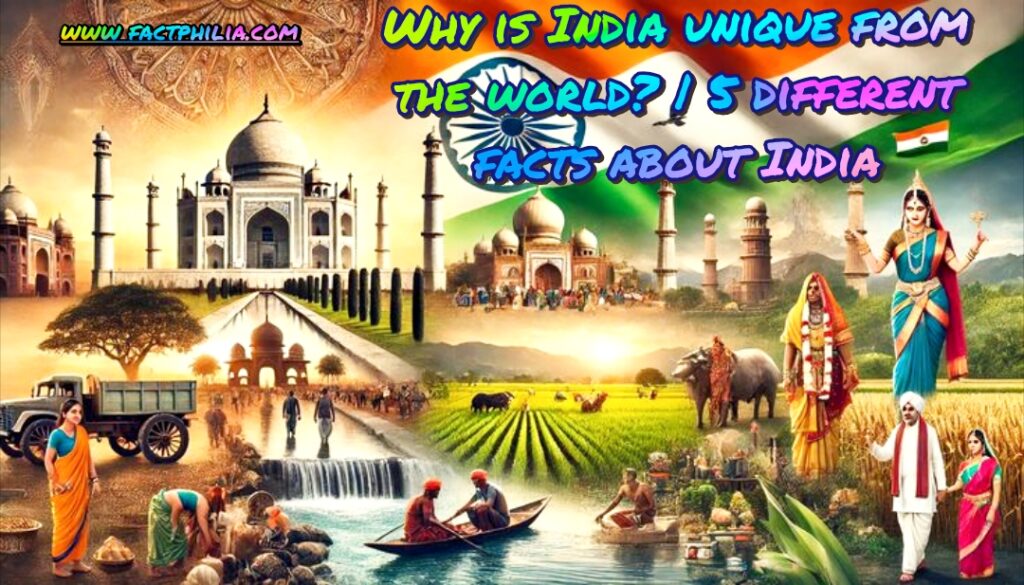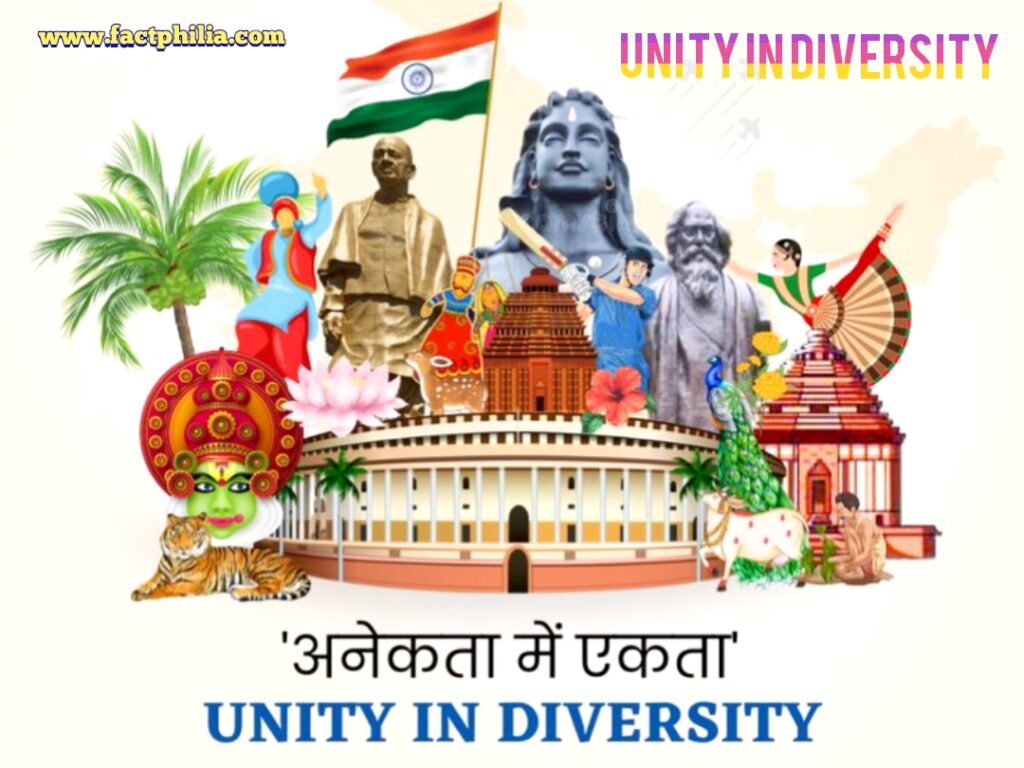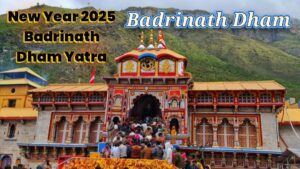India’s unique identity: 5 facts that make it different from the world

Why is India unique from the world? | 5 different facts about India
India is not just a geographical country, but a living confluence of civilization, culture and traditions. This is the reason why the world recognizes it as “Incredible India”. There are many countries in the world, but India stands out because of its uniqueness and identity. Let us know what are the 5 unique facts that make India different from other countries.
Table of Contents
1. Unity in Diversity
India is considered to be the biggest example of “Unity in Diversity”. There is amazing diversity in languages, religions, castes and traditions here. 22 official languages and more than 1600 dialects are spoken in India. Despite this, people live together. This thing makes India completely different from other countries of the world.

India is the only country in the world where despite having so much linguistic, cultural, religious and geographical diversity, the deep roots of unity are visible. Let’s know some unique facts –
1. Connectivity in diversity of languages
22 official languages and more than 1600 dialects are spoken in India. Different states have their own language, but Hindi and English have tied the whole country together. This linguistic diversity makes India the most special.
2. Confluence of festivals
Festivals of every religion and region are celebrated in India – Diwali, Eid, Christmas, Gurupurab and Pongal. People of different backgrounds join each other in these festivals and show the true meaning of “unity in diversity”.
3. Diversity in food, unity in taste
Parathas of North India, Dosa of South India, Dhokla of West India and sweets of East India – the food of every place is different, but the identity of Indian food is the same all over the world – Spicy & Flavourful Food.
4. Heritage of religion and spirituality
India is the land where Hinduism, Buddhism, Jainism and Sikhism originated. Every religion is given equal respect here. This religious tolerance is the biggest strength of India.
5. Unique blend of traditions and art
Every state of India is famous for its dance, music and art – Bharatnatyam, Kathakali, Kathak, Bhangra, Garba. These diverse art styles together make the culture of India more rich.
6. Amazing confluence of geographical diversity
The Himalayas in the north, the desert in the west, the beach in the south and the greenery in the east – India’s geographical diversity makes it a “mini world”. But despite all this, every Indian associates himself with one country, one identity.
7. Diversity in sports, unity in spirit
In India, enthusiasm is seen from traditional sports like Kabaddi, Kho-Kho to cricket and hockey. Despite having different sports, every Indian stands united and supports India when it plays on the world stage.
2. Gift of Yoga and Ayurveda
Yoga and Ayurveda are ancient heritage of India which have been adopted by the whole world. Yoga originated in India has been adopted in more than 190 countries today and International Yoga Day is celebrated every year on 21 June. Ayurvedic medicine is also popular all over the world.

India is famous all over the world for its rich culture and traditions. The biggest contribution among these is Yoga and Ayurveda. Both of these are ancient heritages of India, which have taught not only the Indian lifestyle but the whole world the art of health, balance and living. Let’s know 7 unique facts about them.
1. Yoga originated in India
Yoga started in India about 5000 years ago. It is not just physical exercise, but a lifestyle to balance the mind, body and soul. Today yoga has been adopted by more than 190 countries of the world.
2. International Yoga Day
The United Nations (UN) declared June 21 as International Yoga Day on the initiative of the Prime Minister of India. Now every year crores of people around the world honor the heritage of India by doing yoga on this day.
3. Ayurveda – 5000 years old Indian system of medicine
Ayurveda means “knowledge of life”. Ayurveda is still famous all over the world for its natural herbs and lifestyle based treatments. In this, treatment is done with herbs, diet, lifestyle and natural methods.
4. Popularity all over the world
Today, yoga and Ayurveda are not limited to India only. Yoga centers and Ayurvedic health clinics are open in many countries of America, Europe and Asia. People are now trusting naturopathy more than medicines.
5. Balance of mental and physical health
Yoga and Ayurveda are very important not only for keeping the body healthy, but also for mental peace and spiritual balance. Yoga meditation reduces stress, while Ayurveda makes the body disease free.
6. Harmony with modern medicine
Nowadays doctors also believe that prevention of diseases becomes easier by adopting Ayurveda and Yoga. Therefore, now the combination of Modern Medicine and Ayurveda (Integrative Medicine) is growing rapidly.
7. Identity of India
Yoga and Ayurveda are not just a health system, but also the spiritual and cultural identity of India. This is why they are called the “priceless gift” of India, which is showing the right path of living to the whole world.
Yoga and Ayurveda are such heritages of India which are beyond time and boundaries. From these we come to know that real happiness and health is not hidden in medicines, but in nature and balanced lifestyle. This is why they are considered the priceless gift of India.
3. Largest democracy
India is considered to be the largest democratic country in the world, where crores of people choose the government through their voting rights. Such a huge and strong democratic system is not seen in any other nation.

India: The Largest Democracy in the World | 5 Interesting Facts
India is considered to be the largest and most powerful democratic nation in the world. Here the public has the full right to choose their government. Let us know 5 interesting facts related to India’s democracy, which make it different from other countries.
1. Largest voter base
India has more than 95 crore voters (as of 2024). This number is more than the total population of many countries of America and Europe.
2. Maha Kumbh of Elections
Indian General Elections are considered to be the largest democratic process in the world. In this, lakhs of polling stations are set up and crores of people participate in this festival of democracy together.
3. Use of Electronic Voting Machine (EVM)
India is the first major democratic country to successfully use EVM (Electronic Voting Machine). Now the election process has become fast, secure and transparent.
4. Power of the Constitution
The Constitution of India is considered to be the most detailed and largest written constitution in the whole world. In this, the rights, duties and democratic values of the citizens are explained in detail. This constitution gives a strong foundation to democracy.
5. Celebration of Democracy – Unity in Diversity
India’s elections prove that unity in diversity is the real identity of democracy. Despite having different languages, religions and cultures, people together become a part of democracy.
India’s democracy is not only the largest in the world, but also the strongest. Here the voice of every citizen matters and this is the real strength of India.
4. Religious and cultural heritage
India is the country from where Hinduism, Buddhism, Jainism and Sikhism originated. Not only this, Islam, Christianity, Parsi and Judaism have also got place and respect here. Apart from this, historical heritages like Taj Mahal, Varanasi, Khajuraho and Ajanta-Ellora give India a distinct identity in the world.

Religious and Cultural Heritage of India | 5 Interesting Facts
India is a country that is known all over the world for its religious beliefs and cultural traditions. Not only is there diversity here, but every religion and culture also gets equal respect. Let’s know 5 interesting facts about the religious and cultural heritage of India.
1. Birthplace of four major religions
India is considered to be the birthplace of four major religions of the world – Hinduism, Buddhism, Jainism and Sikhism. Not only this, Islam, Christianity, Zoroastrianism and Judaism also flourish here with peace and respect.
2. Unique heritage of pilgrimage sites
India has thousands of religious places like Kashi, Badrinath, Golden Temple of Amritsar, Bodh Gaya and Ajmer Sharif. These places are not only important from the religious point of view, but are also symbols of cultural unity.
3. Unique tradition of festivals
India is called the “country of festivals”. Hundreds of festivals like Diwali, Eid, Christmas, Guruparva, Holi and Pongal are celebrated here. Every festival brings with it the message of cultural diversity and social unity.
4. Heritage of arts and crafts
Dance, music, drama and painting have a special place in the cultural heritage of India. Classical dances like Bharatanatyam, Kathak, Odissi and Kathakali are considered symbols of India’s rich cultural identity. Also, the architecture and murals of the temples still attract the world.
5. World Heritage Sites
India has more than 40 World Heritage Sites recognized by UNESCO. These include sites like Taj Mahal, Ajanta-Ellora caves, Hampi and Mahabalipuram, which reflect the cultural greatness of India.
5. Spices and Food Capital
India is called the “Spice Capital of the World” because most of the spices in the world are exported from here. Indian food is famous all over the world for its diversity, taste and aroma. Food of North India, dishes of South India and sweets of East India – all these make India unique in terms of cooking.

India: The Capital of Spices and Food | 5 Interesting Facts
India has always been called the “Spice Capital of the World” and “Food Paradise”. The delicious food here, the aroma of spices and their wonderful taste attracts people from all over the world. Let us know 5 unique and fascinating facts related to the spices and food of India.
- Largest exporter of spices
Spices like turmeric, cinnamon, cardamom, red chili and black pepper are sent from India to the whole world.
- Different taste of every region
Every state and region of India is famous for its different tastes and cuisines. Tandoori food of North India, dosa and idli of the South, dhokla of the West and sweets of the East – all together make India the capital of food.
- Ancient Spice Route
India has been famous for spices since ancient times. This was the reason that traders from Europe, Arabia and Asia used to come to India in search of spices. Spices have given India an important place in world trade.
- Ayurveda and Spices
Indian spices are famous not only for their taste but also for their medicinal properties. Turmeric boosts immunity, ginger improves digestion and cardamom helps keep the heart healthy.
- The Magic of Street Food
Indian street food is famous all over the world for its variety and amazing taste. Dishes like chaat, pav bhaji, golgappas, samosa and biryani force everyone to visit the streets of India. This is what makes India the real Food Capital of the World.
Conclusion
India is unique in the world due to its culture, tradition, democracy, yoga-ayurveda and food. These characteristics make it different from other countries. India is not just a country, but it is a living example of human civilization.
Suggested Read 👇
Top 10 most expensive pools | most expensive pool
Top Luxury Travel Destinations | Exclusive Places to Visit in Style
Best Global Destinations | Top Cities in the World
If you any questions drop your comments in comment box
FAQs. Frequency Ask Questions 🤔
Why is India’s cultural diversity so unique?
India is home to over 2,000 ethnic groups and more than 1,600 spoken languages. Each state has its own distinct traditions, festivals, and cuisine.
2. Why is India called the “Vishva Guru” (World Teacher)?
India has been a center of learning since ancient times, with institutions like Takshashila and Nalanda. Yoga and Ayurveda also originated here.
3. Is India’s geographical landscape different from other countries?
Yes, India has a diverse landscape, including deserts (Thar), the Himalayas, dense forests, coastal regions, and fertile plains.
4. Why are so many languages spoken in India?
Due to the coexistence of multiple civilizations and cultures, India has 22 official languages and over 1,600 spoken languages.
5. Is India the largest democracy in the world?
Yes, India is the world’s largest democracy, with over 900 million eligible voters.
6. Why does India have such a vast variety of festivals?
India is home to multiple religions and cultures, celebrating festivals like Diwali, Holi, Eid, Christmas, Pongal, Bihu, and Onam.
7. Does India have one of the oldest civilizations?
Yes, the Indus Valley Civilization (≈ 2600 BCE) is among the world’s oldest civilizations.
8. Does India have the world’s oldest religious traditions?
Yes, Hinduism, Buddhism, Jainism, and Sikhism all originated in India.
9. Do India’s space achievements make it unique?
Yes, India has launched successful space missions, such as Mangalyaan (Mars Orbiter) and Chandrayaan (Moon Mission), at minimal costs.
10. Is India home to the world’s largest film industry?
Yes, the Indian film industry (Bollywood) produces the highest number of movies globally.
Your any questions contact us:-
- Facts About America
- Facts About Australia
- Facts about Dubai
- Facts About Human Science
- Facts About India
- Facts about Mystery & Myths
- Facts about Space & Universe
- Facts about tour and travels
- Facts About Worlds Top
- Facts of History & Culture
- Facts of Science & Technology
- Hotel's of America
- How does the human brain work? 5 Psychology facts that will change your thinking
- Why Do Humans Think This Way? Science Reveals the Hidden Truth
- These 10 Psychology Facts About Human Behavior Will Completely Change How You See People
- Delhi’s 10 Most Expensive Clubs: How Much Does a Night Out Really Cost? (2026)
- America’s 7 Rapidly Rising Cities in 2026 – The 3rd One Will Shock You
FACT Philia
Something About Everything
Essential Blocks for Gutenberg
Add a strong one liner supporting the heading above and giving users a reason to click on the button below.




Leave a Reply